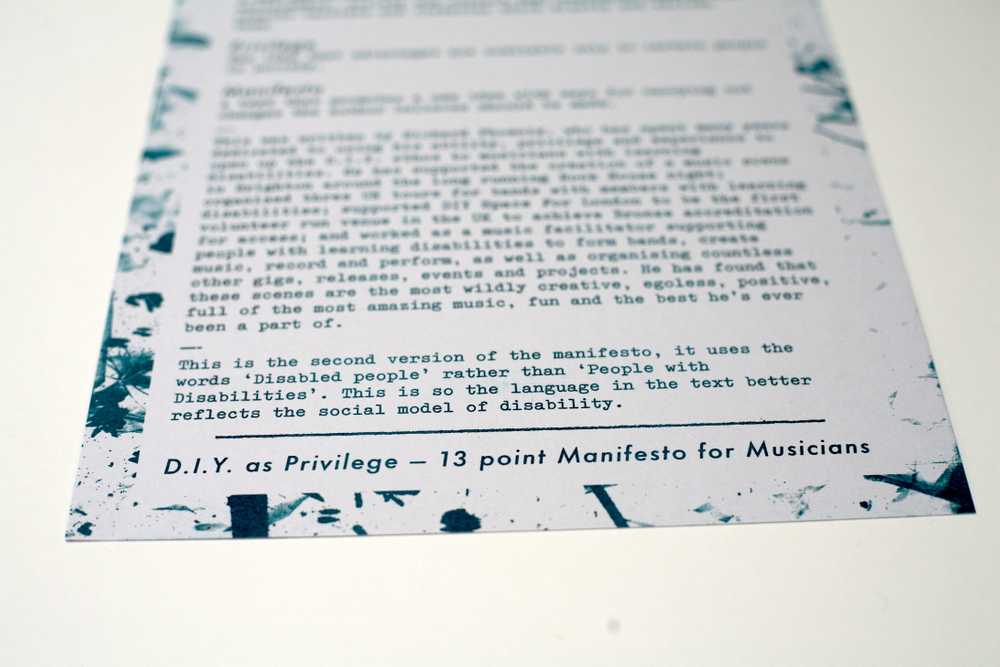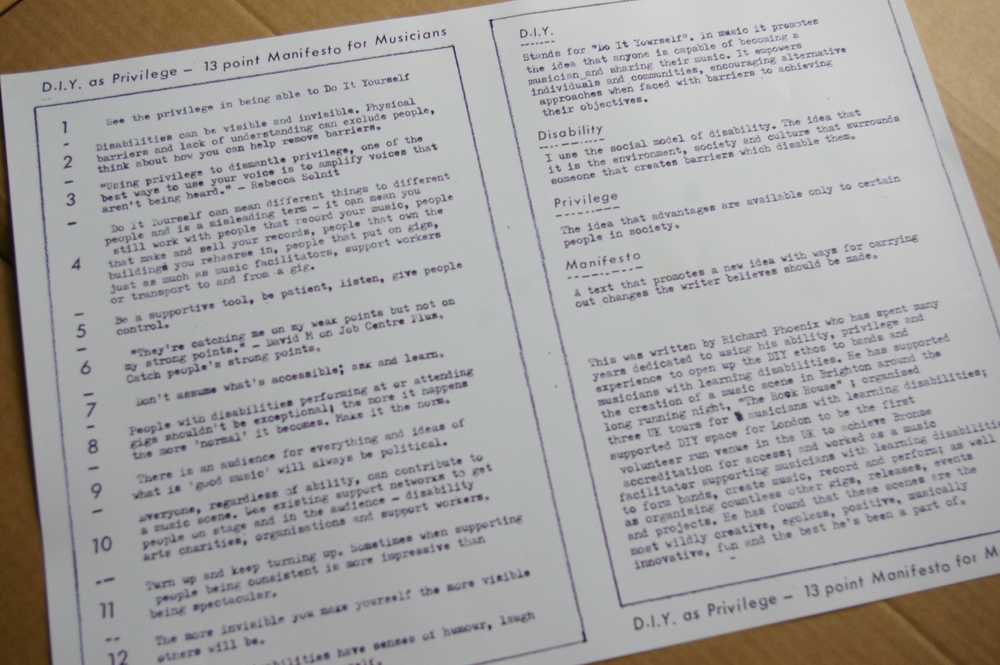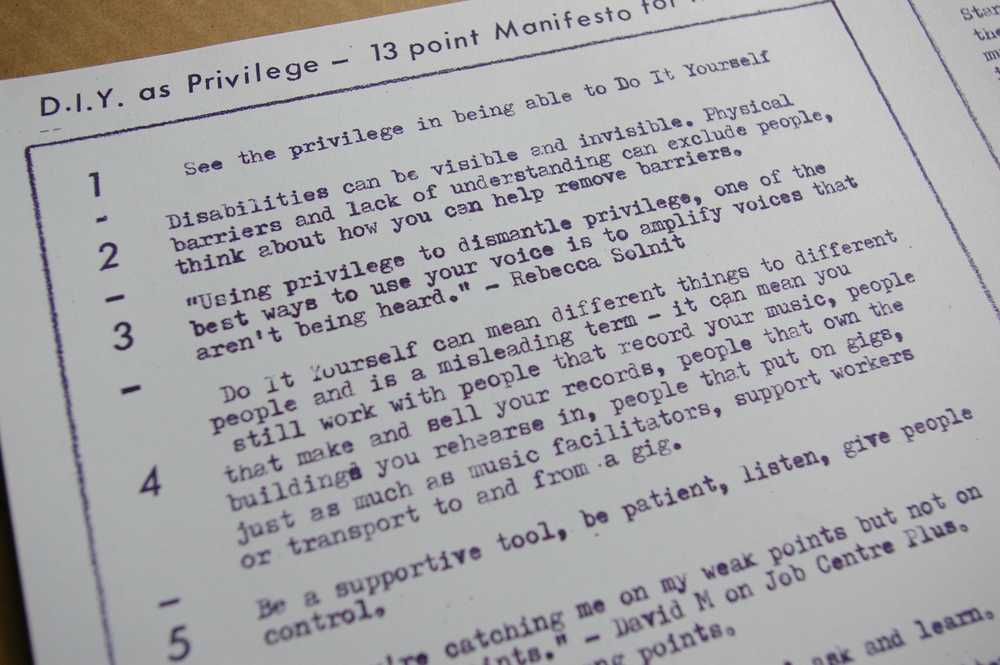D.I.Y. as Privilege
13 Point Manifesto for Musicians
the manifesto
See the privilege in being able to Do It Yourself.
Disabilities can be visible and invisible. Physical barriers and lack of understanding can exclude people, think about how you can help remove barriers.
“Using privilege to dismantle privilege, one of the best ways to use your voice is to amplify voices that aren't being heard”
— Rebecca Solnit
- Do It Yourself can mean different things to different people and is a misleading term — it can mean you still work with people that record your music, people that make and sell your records, people that own the buildings you rehearse in, people that put on gigs, just as much as music facilitators, support workers or transport to and from a gig.
- Be a supportive tool, be patient, listen, give people control.
“They're catching me on my weak points but not on my strong points.”
— David M on Job Centre Plus
Catch people's strong points.- Don't assume what's accessible; ask and learn.
Disabled people performing at or attending gigs shouldn't be exceptional; the more it happens the more ‘normal’ it becomes. Make it the norm.
There is an audience for everything and ideas of what is ‘good music’ will always be political.
- Everyone, regardless of ability, can contribute to a music scene. Use existing support networks to get people on stage and in the audience — disability arts charities, organisations and support.
- Turn up and keep turning up. Sometimes when supporting people being consistent is more impressive than being spectacular.
- The more invisible you make yourself, the more visible others will be.
- Disabled people have senses of humour, laugh with people and enjoy yourself.
about
D.I.Y.
Stands for “Do It Yourself”. In music it promotes the idea that anyone is capable of becoming a musician and sharing their music. It empowers individuals and communities, encouraging alternative approaches when faced with obstacles to achieving their objectives.
disability
I use the social model of disability. The idea that it is the environment, society and culture that surrounds someone that creates barriers and obstacles which disable and exclude them.
privilege
The idea that advantages are available only to certain people in society.
manifesto
A text that promotes a new idea with ways for carrying out changes the author believes should be made.
This is the second version of the manifesto, it uses the words ‘Disabled people’ rather than ‘People with Disabilities’. This is so the language in the text better reflects the social model of disability.
The Manifesto is available to download as a PDF and buy as a risograph print.
why I wrote the manifesto
On the 4th December 2006 I saw the bands Beat Express and Heavy Load play in Brighton. It was the first time I had seen musicians with learning disabilities on stage performing and it was one of the best gigs I’ve ever been to. I wondered why I hadn’t heard of or seen these musicians play before. I thought that if I had enjoyed it so much, then other people would too. It also made me realise the opportunities I had as a musician weren’t available to everyone. So, since then I’ve done all I can to support all kinds of people to make all kinds of music, share this music and get others to watch and listen.
This includes supporting the creation of a music scene in Brighton around the long running Rock House night; organising three UK tours for bands with members with learning disabilities through Constant Flux; supporting DIY Space For London to be the first volunteer run venue in the UK to achieve Bronze accreditation for access from Attitude Is Everything; and working for organisations such as Heart n Soul, Carousel, Club Soda, Culture Shift and Stay Up Late as a music facilitator supporting people with learning disabilities to form bands, create music, record and perform; as well as organising countless other gigs, releases, events and projects.
I think everyone should have the chance to experience a little of what I’ve been lucky enough to experience since 2006. I will forever be grateful for everything I have learnt from being involved with all of this. I wrote the manifesto to try and encourage others to get involved and help make more and more things happen.
In 2006 I only knew two bands existed, now I can write the list below of bands and musicians. Some existed for just one night and some have been playing for years, all of them helped change mine and other people’s worlds, even in some small way. I hope this list will only get longer and longer!
artists
Berhana
Dedji
Fuzzbomb Band
Jade
Rock House Rap Gang
Teddy Boys
Teddy Wynettes
The Revs
Ultimate Thunder
publication
The Manifesto was originally published as a pamphlet by The Fringe and Underground Music Group at Goldsmiths University as part of the ‘Spaces of Making’ project. It was launched on Friday 11th May at an event at Lewisham Art House, with readings from myself, Charles Hayward, Marlo Delara & Sharon Gal.
Since then it has been published in the August 2018 issue of Maximum Rocknroll magazine and Tate’s 2019 Playground Magazine; made available in the Goldsmiths University Library Archive, Good Press Gallery in Glasgow, the Science and Media Museum in Bradford and Liz Harris/Grouper in the US.
Available translations
Greek (download the pdf) — Translated by Zina Sarris for the Sounds Good Project.
Please get in contact if you're interested in stocking or distributing the manifesto or translating it into another language, my email is richardjamesphoenix@gmail.com
2nd version
200 copies riso-graph printed with teal ink on grey 180gsm matt paper. Re-design in collaboration with Sean Roy Parker.
1st version
100 copies riso-graph printed with purple ink on grey 120gsm matt paper. Sold Out
200 copies with various print colours and card colours. Sold Out



